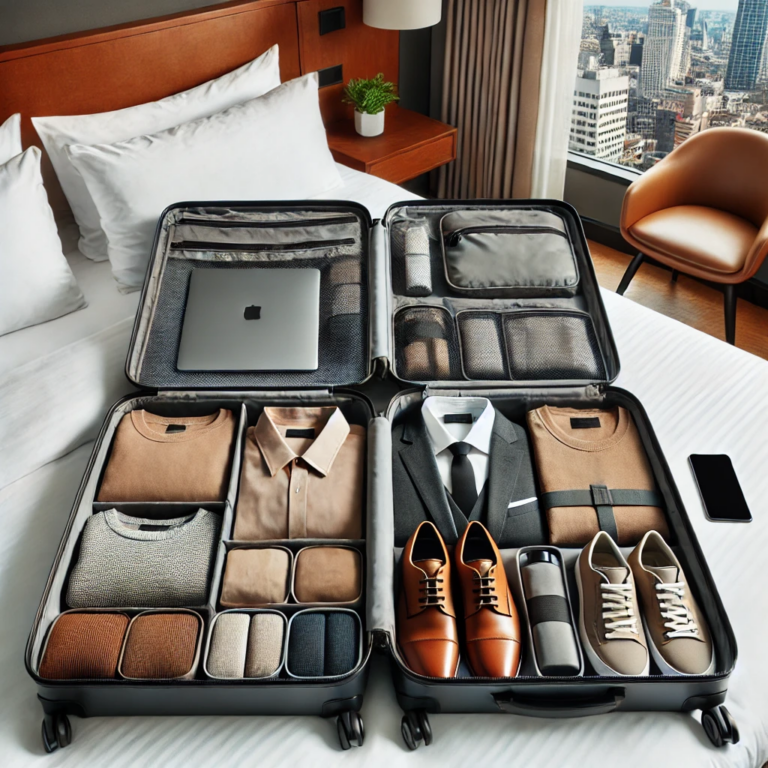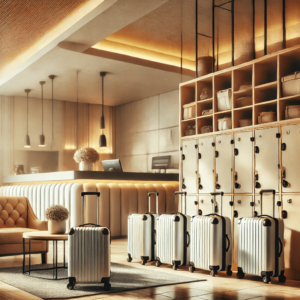Viajar em trabalho pode ser simultaneamente excitante e stressante, especialmente com horários apertados, vários destinos e a necessidade de manter uma aparência profissional. A última coisa com que quer lidar é com uma bagagem pesada ou com a frustração de perder objectos importantes. Fazer uma mala leve não só simplifica a sua experiência de viagem, como também o ajuda a manter-se organizado e eficiente. Este guia completo irá guiá-lo por tudo o que precisa de saber sobre como fazer uma mala leve para a sua próxima viagem de negócios, desde a escolha da mala certa até à utilização de serviços como o Deliverback para recuperar objectos perdidos.
1. Escolher o saco certo
A base para fazer uma mala leve começa com a seleção da mala certa. Para a maioria das viagens de negócios, uma mala de mão ou uma mochila de viagem versátil é o ideal. Estas opções incentivam a embalagem mínima e cumprem os regulamentos de bagagem de mão das companhias aéreas, poupando-lhe tempo no check-in e na recolha de bagagem.
Ao escolher uma mala, dê prioridade à durabilidade, aos materiais leves e à funcionalidade. Uma mala de mão com rodas robustas e uma pega retrátil é óptima para navegar nos aeroportos e nas ruas da cidade. Se preferir uma mochila, procure uma com vários compartimentos, uma bolsa almofadada para portátil e alças confortáveis para facilitar o transporte.
Dica profissional: Considere uma mala híbrida que combine as caraterísticas de uma mala de viagem e de uma mochila. Isto dá-lhe a flexibilidade para navegar facilmente em diferentes cenários de viagem.
2. Planear estrategicamente o seu guarda-roupa
Uma das estratégias mais eficazes para fazer uma mala leve é planear cuidadosamente o seu guarda-roupa. O segredo é selecionar peças versáteis que possam ser misturadas e combinadas para criar vários conjuntos. Eis como o fazer:
Mantenha uma paleta de cores neutras: Escolha vestuário em cores neutras, como o preto, o azul-marinho, o cinzento e o bege. Estas cores são fáceis de misturar e combinar, permitindo-lhe criar vários looks com um número limitado de peças.
Embalagem de peças multifuncionais: Opte por peças de vestuário que sirvam para vários fins. Por exemplo, um blazer pode ser usado por cima de uma camisa formal para reuniões ou combinado com um top casual para um look mais descontraído. Um par de calças escuras pode ser vestido com uma blusa ou com um pólo.
Limitar o número de peças: Para uma viagem de negócios de três dias, pode levar duas camisas ou blusas formais, um par de calças ou uma saia, um vestido versátil, um blazer e um par de tops casuais. Esta combinação permite-lhe criar diferentes conjuntos, mantendo a sua bagagem leve.
Camadas de forma inteligente: Utilize camadas para se adaptar a diferentes condições climatéricas sem aumentar o volume da sua bagagem. Uma camisola leve ou um casaco de malha podem ser colocados por cima de camisas ou blusas para aumentar o calor ou usados sozinhos em climas mais quentes.
Dica profissional: Crie uma lista de embalagem com base na duração da sua viagem para garantir que leva apenas o que precisa, evitando a tentação de levar demasiada bagagem.
3. Minimizar o calçado
Os sapatos podem ser um dos objectos mais pesados e que consomem mais espaço na sua bagagem. Para manter a sua bagagem leve, limite-se a dois pares de sapatos: um par formal para reuniões e um par confortável para viagens e actividades casuais.
Sapatos formais: Escolha um par que seja suficientemente confortável para dias longos, mas suficientemente elegante para ambientes de trabalho, como mocassins em pele, sabrinas ou saltos baixos.
Sapatos casuais: Leve um par de ténis leves ou slip-ons que sejam confortáveis para caminhar e suficientemente versáteis para jantares informais ou passeios turísticos.
Use o seu par mais volumoso: Poupe espaço na sua mala usando o seu par de sapatos mais volumoso durante a viagem.
Dica profissional: Considere levar sapatos dobráveis ou sapatos de viagem compactos que possam caber facilmente na sua bagagem e proporcionar conforto após um longo dia.
4. Utilizar cubos de embalagem e sacos de compressão
Os cubos de arrumação e os sacos de compressão são ferramentas essenciais para organizar a sua mala e, ao mesmo tempo, manter a sua bagagem leve. Estes artigos ajudam a comprimir a sua roupa, libertando espaço e tornando mais fácil encontrar o que precisa.
Organizar por categoria: Utilize cubos de embalagem diferentes para diferentes tipos de roupa - camisas num, calças noutro e roupa interior num terceiro. Isto ajuda a manter a mala arrumada e facilita a localização dos artigos.
Enrolar a roupa: Enrolar a roupa em vez de a dobrar pode poupar espaço e reduzir as rugas. Coloque os artigos enrolados em cubos de embalagem para maximizar o espaço.
Utilize sacos de compressão para artigos volumosos: Para artigos maiores, como casacos ou camisolas, utilize sacos de compressão para espremer o excesso de ar e reduzir o seu volume.
Dica profissional: Embale um cubo de embalagem separado para a roupa suja para a manter separada da roupa limpa.
5. Simplifique os seus artigos de higiene pessoal
Os produtos de higiene pessoal podem acrescentar peso desnecessário à sua bagagem. Para manter a sua bagagem leve, simplifique os seus artigos de higiene pessoal utilizando recipientes de viagem e produtos multiusos.
Utilize recipientes de viagem: Transfira os seus produtos favoritos para frascos de viagem para levar apenas o suficiente para a sua viagem. Estes recipientes estão frequentemente disponíveis em conjuntos que cumprem os regulamentos da TSA.
Opte por produtos polivalentes: Escolha artigos que tenham várias funções, como um hidratante com SPF ou um champô e amaciador 2 em 1.
Confiar nas comodidades do hotel: Muitos hotéis oferecem produtos de higiene pessoal gratuitos, como champô, amaciador e gel de banho. Poupe espaço utilizando-os em vez de trazer os seus.
Invista num saco de toilette suspenso: Um saco de toilette suspenso mantém os seus artigos de higiene organizados e facilmente acessíveis, quer esteja num quarto de hotel ou numa casa de banho partilhada.
Dica profissional: Minimize a sua rotina de maquilhagem com produtos versáteis, como um hidratante com cor que funciona também como base e protetor solar.
6. Embalagem inteligente de tecnologia essencial
Os viajantes em negócios dependem frequentemente da tecnologia, mas o equipamento tecnológico pode aumentar o peso e a confusão se não for embalado de forma inteligente. Eis como manter os seus artigos tecnológicos essenciais leves:
Dar prioridade a dispositivos polivalentes: Bring devices that serve multiple functions, such as a smartphone that doubles as a camera, or a tablet that can replace your laptop for presentations and note-taking.
Organize Cables and Accessories: Use a small pouch or ziplock bag to keep all your chargers, adapters, and cables in one place. This helps prevent tangling and makes it easy to find what you need.
Carry a Compact Power Bank: A small, lightweight power bank can keep your devices charged throughout the day without the need to carry bulky chargers.
Dica profissional: If your business trip involves presentations, consider bringing a portable projector or HDMI adapter to ensure compatibility with various equipment setups.
7. Prepare for Unexpected Scenarios with Deliverback
Even the most careful travelers can lose items during a trip, whether it’s a laptop left at a conference or a jacket forgotten in a hotel room. This is where Devolução comes in—a service designed to help travelers recover lost items quickly and efficiently.
What is Deliverback? Deliverback is a lost and found service that allows you to report a lost item at hotels, airports, and other travel locations. Instead of wasting time calling different places to locate your lost belongings, Deliverback does the legwork for you. Simply report your lost item on their platform, and they coordinate with their network of partners to find it and arrange for its return to you.
How to Use Deliverback:
Report Your Lost Item: Visit the Deliverback website or app and provide details about the item you’ve lost, including the location and a description.
Let Deliverback Do the Work: Deliverback will reach out to their network of hotels, airports, and other venues to locate your lost item.
Receive Your Item: Once your item is found, Deliverback arranges for it to be shipped back to you, no matter where you are.
Benefits of Using Deliverback:
- Time-Saving: Avoid spending hours on the phone trying to track down your lost items.
- Global Coverage: Deliverback works with a wide network of partners across the world, making it easier to recover items no matter where you travel.
- Paz de espírito: Knowing that you have a reliable service to recover lost items can reduce stress and help you focus on your business trip.
Dica profissional: Always attach a small tag with your contact information to valuable items like laptops and bags. This makes it easier for Deliverback and others to identify and return them to you.
8. Keep Essential Documents Accessible
When traveling for business, it’s crucial to keep your essential documents organized and easily accessible. This includes your passport, boarding passes, business cards, and any work-related documents. Here’s how to manage them effectively:
Use a Travel Wallet: A travel wallet or document organizer can keep all your important documents in one place, making them easy to access when needed.
Digital Copies: Take photos or scan important documents and save them on your phone or a cloud service. This provides a backup in case you lose the physical copies.
Minimize Paper: If possible, opt for digital versions of boarding passes, itineraries, and business cards to reduce the amount of paper you carry.
Dica profissional: Always keep your travel wallet in your carry-on or personal item, not in your checked luggage.
9. Pack a Small Emergency Kit
While packing light is about minimizing, it’s still wise to prepare for minor emergencies. A small kit with the following items can be a lifesaver:
- Basic First Aid Supplies: Include band-aids, pain relievers, motion sickness tablets, and any personal medications.
- Stain Remover Pen: Great for tackling spills on the go.
- Portable Sewing Kit: Useful for quick clothing repairs.
- Hand Sanitizer and Wipes: Essential for maintaining hygiene during travel.
Dica profissional: Keep your emergency kit in an easily accessible pocket or section of your bag so you can quickly grab it when needed.


